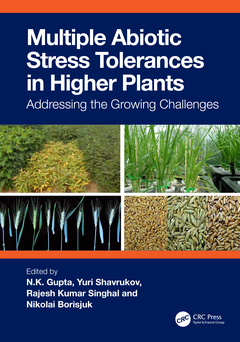Multiple Abiotic Stress Tolerances in Higher Plants Addressing the Growing Challenges
Coordonnateurs : Gupta N.K., Shavrukov Yuri, Singhal R.K., Borisjuk Nikolai

In the last 50 years, classical breeding has played a significant role in achieving higher crop productivity, but major crops have reached a plateau in their yield potential. Therefore, the current focus for sustainable intensification of agriculture is the use of biotechnological approaches to enhance the yield potential by combating the yield losses that occur due to abiotic stresses. The abiotic stresses are governed by multigenes, and therefore, a holistic approach is needed to get success in imparting stress tolerance to enhance the yield potential of our crops.
Plants face multiple stress conditions during their life stages and adopt several physiological, biochemical, and molecular strategies to combat that, which are sometimes not sufficient to survive, particularly crop plants. The climate change era has created a need to understand the abiotic stresses in a holistic way. Therefore, a deep understanding of multiple abiotic stress mechanisms is necessary to develop crops tolerant to climate fluctuation.
With this background, the outline of this book covers the following features:
? Agriculture sustainability and molecular understanding of multiple stress tolerance
? Systems biology for life-history strategies, conventional and genomic approaches above and underground
? Genetic resources and molecular understanding of seed priming
? Molecular signaling compounds, cell signal transduction, and crosstalk between plant growth hormones and regulators
? Roles Transcription factors, LEA proteins, reactive oxygen species and alternative oxidase
? Genome editing, metabolomics, and ?omics? technologies
Dr. N.K. Gupta obtained his PhD (1997) from prestigious Indian Agricultural Research Institute, New Delhi, India. He was awarded Biotech Overseas Associateship (2006-2007) by Government of India and worked as Post Doc at University of Adelaide, Adelaide, Australia. He also served as Visiting Professor at the University of Nebreska, Lincoln, USA (2013) and University of Tottori, Japan (2023). At present he is working as Professor (Plant Physiology) & Director, Education at SKN Agriculture University, Jobner. Dr. Gupta has teaching experience of more than 25 years and guided 15 PG students for dissertation. He is Fellow of many academic societies. Recently he has been awarded prestigious J. J. Chinoy Gold Medal award by ISPP, New Delhi (2019). He is recipient of first RS Paroda Best Scientist Award (2020). He has published more than 60 research papers in national and international journals including Plant Cell Environment, Photosynthetica, Plant Growth Regulation, Journal of Agronomy & Crop Science, Functional & Integrative Genomics etc. He has four authored books and ten book chapters published by Nova Publication, CRC Press etc. His H-Factor is 18.0.
Dr. Yuri Shavrukov received his PhD degree (1991) at the Institute of Cytology and Genetics, Russian Academy of Sciences, Novosibirsk. Russia, with following employment in the same Institute and combined his research with teaching at Novosibirsk State University.Hecompleted his STA Post-Doctoral Fellowship (1995-1996) at the Hokkaido National Agricultural Experiment Station (Japan); and was awarded JSPS Research Fellowship at the Hokkaido University (1998) and JSPS Senior Research Fellowship at Okayama University (2012). In 2001, Dr. Shavrukov was selected and employed by CSIRO (Commonwealth Scientific and Industrial Research Organisation), Adelaide, Australia. After CSIRO, he received a position at the University of Adelaide, Plant Genomics Centre (2005-2
Date de parution : 10-2023
17.8x25.4 cm
Thèmes de Multiple Abiotic Stress Tolerances in Higher Plants :
Mots-clés :
Multiple stress tolerance; Oxidative stress; Plant growth hormones; Transcription factors; CRISPR; Biochemical pathways; Abiotic Stresses; Salt Tolerance; Salinity Stress; Abiotic Stress Tolerance; Salt Stress; Drought Stress; Sodic Soil; Combined Stresses; Stress Tolerance; Heat Shock Transcription Factors; Saline Soil; Heat Shock; WRKY Transcription Factors; Osmotic Adjustments; HSFs; Stomatal Closure; Osmotic Stress; Antiporter SOS1; DNA Methylation; Arabidopsis Thaliana; TCA Cycle; Drought Tolerance; MAPK; Mitogen Activated Protein Kinases



